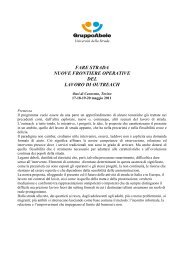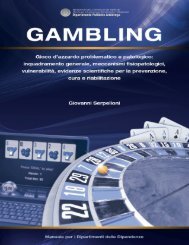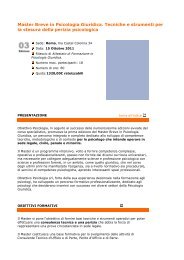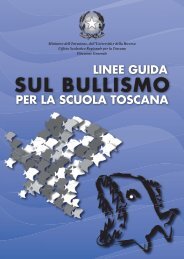Neuroscienze e dipendenze - Dipartimento per le politiche antidroga
Neuroscienze e dipendenze - Dipartimento per le politiche antidroga
Neuroscienze e dipendenze - Dipartimento per le politiche antidroga
Create successful ePaper yourself
Turn your PDF publications into a flip-book with our unique Google optimized e-Paper software.
284 - E<strong>le</strong>menti di NEUROSCIENZE E DIPENDENZE<br />
CDC) School Program. Parents have the potential to<br />
be the vehic<strong>le</strong>s of change for their children’s behavior.<br />
Via parent training and multip<strong>le</strong> family group meetings,<br />
parents <strong>le</strong>arn techniques on how to address chal<strong>le</strong>nging<br />
behaviors in their children, how to provide<br />
structure and consistency in their home program, and<br />
more importantly; how to develop and foster an improved<br />
parent-child relationship. During the introduction<br />
to parent training (IPT) classes and Multip<strong>le</strong> Family<br />
Groups (MFG), parents are taught the basics of the<br />
behavioral princip<strong>le</strong>s via the functional behavioral assessment<br />
(FBA) model and are also provided a brief<br />
overview of the basics of a behavioral intervention plan<br />
(BIP), and positive practices and interventions. Some<br />
of the strategies that are taught during both the IPT<br />
classes and MFG groups are positive praise and attention,<br />
transitional warnings, the Pre-Mack princip<strong>le</strong>,<br />
planned ignoring, token economy, planning ahead,<br />
time out from reinforcement, losing privi<strong>le</strong>ges and<br />
prob<strong>le</strong>m solving. Communication, collaboration, compromise,<br />
and consistency between the school team and<br />
families is emphasized and reinforced as a key e<strong>le</strong>ment<br />
of a child’s success as taught in the IPT classes and<br />
MFG groups.<br />
SOCIAL SKILLS GROUPS<br />
Nicola Byford<br />
UC Irvine Child Development Center Psycho-Educational<br />
School Model<br />
Social skills training is a distinctive modu<strong>le</strong> which is a<br />
core component in the University of California, Irvine<br />
Child Development Center (UCI-CDC) School Program.<br />
As a student of the UCI-CDC school program,<br />
children participate in an intensive social skills training<br />
course for one hour every day in a small group format<br />
which has also been incorporated into the school curriculum.<br />
The goal of the group is to teach children how<br />
to navigate social situations successfully with both<br />
adults and peers. The social skills groups are facilitated<br />
by marriage and family therapist interns and social<br />
skills counselors in collaboration with the child’s<br />
teacher and the behavioral specialists. The school team<br />
(including the teacher, behavioral specialist, social skills<br />
therapist, and psychologist) collaboratively work together<br />
to imp<strong>le</strong>ment the social skills <strong>le</strong>ssons both during<br />
structured and unstructured times. This collaboration<br />
between the multidisciplinary team members ensures<br />
that there is consistency and generalization in the<br />
school program and beyond. Some of the strategies that<br />
are taught in the social skills classes include following<br />
directions, accepting, good sportsmanship, ignoring,<br />
prob<strong>le</strong>m solving, assertiveness training, and self-regulation.<br />
ORGANIZATION AND DISSEMINATION OF<br />
EVIDENCE BASED RESEARCH IN<br />
NEURODEVELOPMENTAL DISORDERS.<br />
Chiara Maria Polzonetti<br />
UC Irvine Child Development Center Psycho-Educational<br />
School Model<br />
The purpose of this talk is to inform everyone how information<br />
is col<strong>le</strong>cted at the UC Irvine Child Development<br />
Center (CDC) clinic and school. We gather clinical<br />
and scholastic information that indexes progress in<br />
behavioral and intel<strong>le</strong>ctual <strong>per</strong>formance in children with<br />
neurodevelopmental disorders. This approach provides<br />
methodological foundation for longitudinal research in<br />
children at risk of school failure and social chal<strong>le</strong>nge, and<br />
in young adults at risk of substance abuse.<br />
Families referred to the CDC undergo screening for<br />
family history of mental disorders and drug abuse. The<br />
children go through extensive neuropsychological testing<br />
for symptoms of disruptive behavior in the classroom,<br />
<strong>le</strong>arning impairment, dysfunctional emotional<br />
regulation and excessive variability in <strong>per</strong>formance that<br />
requires mental effort. This assessment can be repeated<br />
at several time points, building the individual’s clinical<br />
history and targeting behaviors for intervention. Once<br />
the child is accepted in the school program additional<br />
socio-behavioral interventions may occur (social-skills<br />
and family training modu<strong>le</strong>s). At the school target behaviors<br />
are monitored during classroom hours on a daily<br />
basis. Records of time-outs, combat behaviors, classroom<br />
interruption, sportsmanship and good response following<br />
instructions, are also accumulated. The information<br />
is organized into a database.<br />
The two components of the CDC, the school and<br />
the clinic, are necessary for col<strong>le</strong>cting all re<strong>le</strong>vant information<br />
for an intervention in the individual and his family.<br />
Questions remain unanswered about evidence-based<br />
research for children with behavioral and <strong>le</strong>arning prob<strong>le</strong>ms.<br />
Our approach also offers a unique opportunity for<br />
evidence-based research and time-sensitive data. A typical<br />
examp<strong>le</strong> of this approach is the laboratory-school<br />
classroom model. The laboratory-school model is designed<br />
to exercise tight control of the timing and context<br />
of measurements by establishing a cyc<strong>le</strong> of activities repeated<br />
across each day.<br />
We will present an examp<strong>le</strong> of research <strong>per</strong>formed at<br />
the CDC studying neural correlates of cigarette smoking.<br />
Specifically we will show preliminary evidence of<br />
differences in frontal brain hemodynamics during cigarette<br />
smoking in young adults with prob<strong>le</strong>ms of attention<br />
and emotion regulation.<br />
Finally we will present standard procedures of dissemination<br />
and training. We are active promoting<br />
know<strong>le</strong>dge and awareness of neurodevelopmental disorders<br />
in the Orange County.












